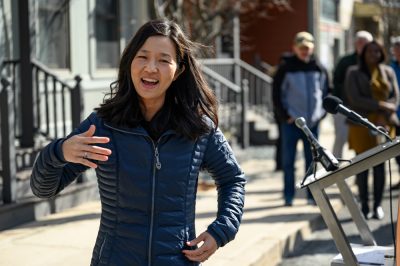
Mayor Michelle Wu visited Allston Thursday morning and announced the next steps in her plan to make Boston a Green New Deal city.
She outlined two strategies: adopting a new green energy building code and a large building green energy retrofits program.
“Here in Boston, buildings are our biggest source of pollution and emission,” Wu said. “One of the most important things we can do is to take decisive climate action, ensuring that our buildings meet the highest emission standards.”
With the new specialized code, new buildings are required to be mixed fuel, zero-energy or all-electric. Old buildings that still rely on fossil fuels will be set up for future electrification.
The retrofits program aims to make energy-efficient housing more affordable and will provide close to $50,000 per unit in income-restricted buildings.
“The residents of our affordable housing are the folks who need this improvement the most,” said Councilor Liz Breadon. “They live on a limited income and making some savings to their energy bills is going to be life changing.”
The Brian J. Honan Apartments, where Mayor Wu made the announcement, will be newly renovated as part of the new program.
“A lot of our affordable housing is older, it’s less energy efficient and it’s a really critical area that we need to work on to make it more energy efficient and to address our new climate goals,” Breadon said.
Bisa Bowen, a resident in the Brian J. Honan community, said these renovations will be a “big move” forward for the community.
“For the past 15 years, we’ve been through a lot of changes in this particular community,” Bowen said. “I want to see our community change with the new buildings coming up…I want to see Brian J. change with the rest of the community.”
Oliver Sellers-Garcia, Boston’s Green New Deal director, said the retrofit program will have long-term effects on not only affordable housing communities but also the entire city of Boston.
“Eighty-five percent of the square footage that we have today is still going to be around in 2050, so we need to work on the buildings that we have now and bring them into the next generation,” Sellers-Garcia said.
Kenzie Bok, the District 8 city councilor, said the retrofit plan is a “generational-scale solution” to the problem of the city’s energy efficiency.
“I think it’s really important for people to recognize that we’re not just talking about a sort of side thing, we’re talking about 60% of the city’s emissions and the emissions that we need to reduce and disappear by the time of our targets,” Bok said.
Wu stressed the importance of taking “decisive climate action” to meet energy efficiency requirements in Boston.
“None of [this] matters if our city and planet are no longer livable for our kids and their kids,” Wu said. “Which is why as a city we are committed to finding solutions to not only address our everyday issues, but our existential ones.”






















































































































